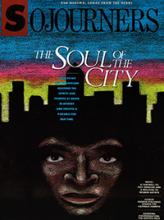Sometimes the advent of death is like a thief in the night, too.
Though we are surrounded by its presence daily, on the mean streets of our cities and in the countrysides of the imperial peripheries, though we so often have skirmished publicly with its political accessories, still, when it comes for one of our own, we are stunned. We who labor to confront reality with the gospel's dreams of justice and peace have often had our dreams pulled up short by the reality of death. But never more rudely, more intrusively, than when it invades our circle, especially in a manner sudden and senseless.
So with the abrupt and profoundly un-timely departure of Elizabeth Anne Radcliffe. It haunts, like an unresolved chord in an unfinished symphony. She was surely among the finest people ever to identify herself with "radical Christianity"; not a saint, but bloody faithful.
Sojourners readers would not have known Libby, an Australian. But it is in part because her journey paralleled so many of ours over the last two decades, and in part just because our lives as Christians seeking the kingdom are woven (whether we acknowledge it or not) from a common fabric, that it seems important to try to understand and honor her passing.
DURING THE 1970s, at the same time that "alternative" Christian communities were springing up around North America, a similar movement was under way in Australia. With the uncompromising fervor indigenous to evangelical Protestant renewal, a small group of lay young people, ministers, and theologians were challenging both the established churches and the burgeoning "Jesus movement" of Australia with the gospel of radical discipleship.
Read the Full Article

